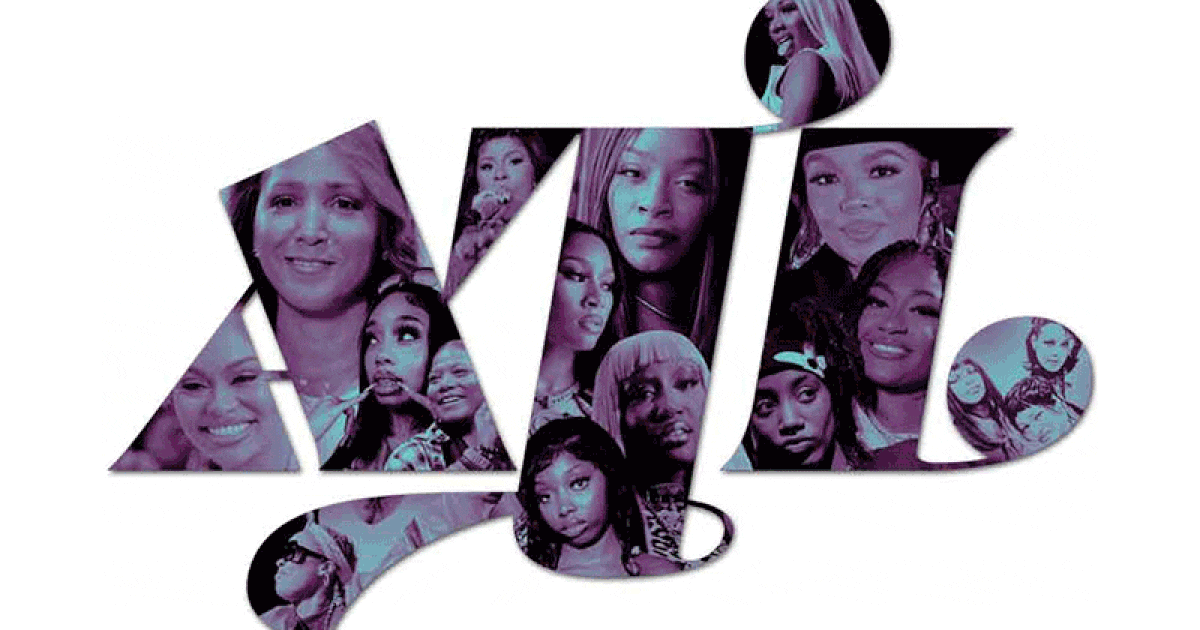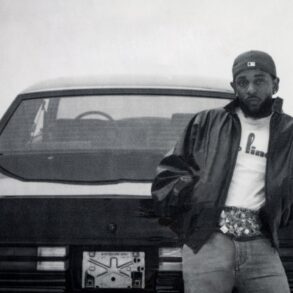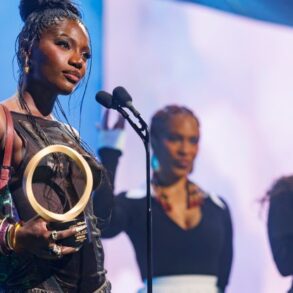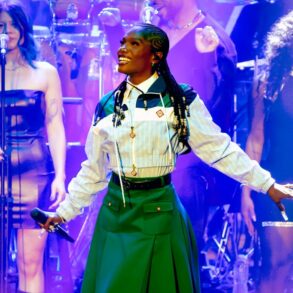
As hip-hop grew up, prolific female rappers in the 1980s and 1990s garnered mainstream attention and demanded respect for their rhymes but were still overlooked for shaping hip-hop’s sound across the country: New York (MC Lyte, Foxy Brown, Lil Kim, etc.); New Jersey (Queen Latifah, Lauryn Hill, Rah Digga, Lady Luck); Los Angeles (Yo-Yo, MC Trouble, The Lady of Rage); Memphis (Gangsta Boo, La Chat); Chicago (Shawnna, Da Brat), Philadelphia (Eve, Bahamadia); New Orleans (Mia X); Virginia (Missy Elliott); Miami (Trina).
But in Atlanta, a city revered as a Black mecca for music and culture, that same rich history for female rappers doesn’t exist.
“(We were) an endangered species,” said Princess, a member of the Atlanta rap group Crime Mob.
This year marks the 50th anniversary of hip-hop, a cultural phenomenon that sparked a groundbreaking musical genre. Although Atlanta’s emcees may have picked up the mic nearly a decade after the movement was birthed in Bronx, New York, ATL’s influence is undeniable. The Atlanta Journal-Constitution is celebrating the city’s influence with the upcoming premiere of “The South Got Something To Say,” an insightful documentary on Atlanta’s rise in hip-hop. Accompanied by a monthlong, 14-story series, the AJC is exploring how Atlanta cemented its spot in hip-hop history. Follow along online, in print and in the Unapologetically ATL newsletter.
The universal plight of female rappers trying to gain visibility within the genre has always been a notoriously difficult climb that has been even more true for Atlanta’s female rappers. As influential and extensive as the city’s rap history is, it is also overwhelmingly male. In fact, Atlanta’s rap terrain is so rigidly male-dominated that it wasn’t until 2021 that a solo female rapper from Atlanta had a certified platinum single. Now, there’s a fresh variety of female rap upstarts who are creating a sustainable landscape for Atlanta female rappers to both exist and thrive. They are carrying on the legacy of the city’s few and negligently overlooked female rap veterans.
Credit: Courtesy of Silk Tymes Leather
Credit: Courtesy of Silk Tymes Leather
It ain’t where ya from … it’s where ya at
In the late 1980s, Silk Tymes Leather, an all-female rap trio, made history as the first Atlanta rap group to sign a deal with a major label. Their first and only album, “It Ain’t Where Ya From … It’s Where Ya At,” dropped in 1990 via Geffen Records. Silk Tymes Leather, composed of Jordan Victoria, Jocelyn Rabon and Dyonna Lewis, was the first group developed by legendary producer and songwriter Jermaine Dupri. Yet the group’s debut didn’t achieve mainstream success nor is it remembered for its significance to Atlanta rap.
But Victoria, the group’s founding member, will never forget the history they made. The College Park native said the world just wasn’t ready for a Southern female rap group at that time. The group faced a double burden: being a rap group from Atlanta at a time when Atlanta wasn’t dominant in the rap scene, and being female rappers at a time when that also wasn’t popular.
“But we had a good team behind us and the record label believed in us, and we believed in ourselves,” she said. “Unfortunately for us on that side, we were a little ahead. But again, we were making history.”
Rasheeda Frost had a similar trajectory during her rise as a rapper in Atlanta. Before she was labeled the “Queen of Crunk” and became a mainstay on the hit reality TV series “Love & Hip-Hop Atlanta,” she was a member of the rap group Da Kaperz. While a student at North Clayton High School, she formed the independent trio with two friends. They released their self-titled debut album in 1998. But they disbanded shortly after that because “things just went in different directions.” Frost swiftly launched her solo career with the release of her debut single “Do It” in 2000.
Featuring Re Re, Que Bo Gold and Pastor Troy, “Do It” peaked at no. 7 on Billboard’s Hot Rap Songs, and it is considered an essential crunk anthem. Still, she didn’t feel like she received the respect she deserved from record labels. So she decided to go the independent route.
“They definitely didn’t know how to break a female rapper out of the South, which was extremely rare at that time … it’s hard for females to break out in an industry, period,” she said. “Well, now I will say kudos to all the females that we have out here. This is a difficult business for women. We have so much to deal with, so much in trying to gain respect, be respected, be heard, be taken seriously, not taken advantage of, and it was so many things.”
Today, Frost owns a boutique, restaurant and hosts her web series “Boss Moves.” Although she doesn’t make as much music anymore, she credits her hustle for making her a pioneering rap artist in Atlanta.
“I learned to appreciate the grind. It was very real for me. People are always like, ‘How do you feel being one of the females? I don’t feel like you get your flowers.’ And, you know, at this point, it’s like my flowers is the fact that I’m an independent artist.”
Credit: Curtis Compton
Credit: Curtis Compton
Princess from Crime Mob cites Rasheeda as an inspiration. Born Venetia Lewis, Princess is one of two women in the six-member group. Crime Mob formed in the early aughts while its artists were still in middle school and high school. With the release of their smash record “Knuck If You Buck” in 2004, Crime Mob became a necessary addition to Atlanta’s crunk music legacy.
Although she felt the void of female rappers in the city, it didn’t consume her. She was just focused on making the best music with her childhood friends.
“I don’t think we really focused on that,” she said. “Atlanta is really known for our camaraderie, so it wasn’t really about one person trying to stand out or anything.”
Since Silk Tymes Leather, there hasn’t been another female all-rap group from Atlanta to make the same strides, but she’s proud the group opened the door for the new class of female rappers.
“I’m happy to see the outcome now of female rappers that are there (and) that we actually paved the way for them to be platinum artists, to be proud, to say where you’re from and not have to suppress saying that you’re from Atlanta, you’re from the South or any other place that you may be from. You’re holding it up on your shoulders.”
Demanding respect
The current female rap renaissance, which exploded after the rise of Cardi B’s monstrous 2017 hit “Bodak Yellow,” gave space for female rappers to not only be seen and heard but to dominate an entire genre. While some of their male counterparts often appear to be bored and can’t seem to evade their monogamous relationship with misogyny (see: “For All the Dogs,” the latest installment of Drake’s sharp decline into toxic masculinity), women are making rap music more interesting.
Artists like Megan Thee Stallion and the City Girls have turned misogyny on its head with their raps about sexual autonomy. Doja Cat has skyrocketed to genre-bending superstardom and can still outrap your favorite rapper on their best day. Rico Nasty has proven that hip-hop has room for a punk-rap world. This versatility is something that Kaliii admires. The Roswell rapper became a viral sensation this year with the release of her hit single “Area Codes.” Along with Latto (who made history last year as the first female rapper to have a No. 1 song on pop, rhythm and urban radio with “Big Energy”) and Baby Tate, Kaliii is the newest addition of female rappers from the city capturing mainstream attention.
“Honestly, it feels so good to be a part of it and to be representing for females who look like me,” she said, “and the fact that it can be so many of us right now that’s taking over and winning. And even when you think about it, when you think out a song that’s going up crazy right now, it’s a female.”
For Baby Tate, “the boys are not running at the same pace that the girls are right now.” Tate, born Tate Farris, is the daughter of R&B singer Dionne Farris. Tate’s debut album “Girls” dropped in 2019. Earlier this year, “Hey Mickey” — a bubbly rap song she created in 2016, went viral on TikTok — and became a hit. Since then, she’s carved her own lane that blends pop, rap, R&B and dance music as if they’re one genre. Her next act? “Baby Tate Presents—Sexploration: The Musical,” a five-track EP that drops on Oct. 27. Each song will be accompanied by a visual that’s aimed to give listeners a glimpse into her bubbly, sex-positive and gender-inclusive cinematic universe.
Although female rappers are now seeing unprecedented success by creating their own sounds and celebrating their individuality, Tate admits the road to being respected for that remains an uphill battle.
Credit: Tyson Horne
Credit: Tyson Horne
“I think that for as long as women in general are not respected, neither will female rappers be,” she said. “So that’s like a larger topic. But I think that it is harder for us to gain respect from our peers, from the critics, from the world, and we literally have to go like a thousand times harder, which is why I feel like we are honestly … just better at things. I think that’s why we are going so hard right now and why there are so many women. Like, we are not playing with these songs.”
Tate recalls a moment when she performed at the music festival Afropunk Atlanta in 2021. What was supposed to be a monumental moment for her career turned sour after she was severely body-shamed online.
“Literally, when I walked out on stage, the crowd went crazy. (They) were like, ‘Oh my God. This (expletive) looks so good.’ And then I get online after and I post pictures of myself, and people were in my comments and they’re like, ‘You could stand to lose 10 pounds.’ And I’m like, ‘You could not stand to lose $10 or you’ll go bankrupt, baby. So I think you should mind your business.’”
It was an appropriate clapback for an unfair critique of her weight. But the self-assured rapper said the moment did impact her confidence. She even stopped working out for a moment, since people thought she didn’t care about her body. But now she cares less about that hate.
“You don’t have to see me and say, ‘Yeah, I love it.’ You don’t have to say anything, actually. But what we do have to do is accept it. This is my body. This is what I look like. Accept it. That’s it.”
Making a name in Atlanta
Now, there’s a lush class of newer female rappers in Atlanta who are hustling to achieve their breakthrough moment. Artists like Vayda, Bktherula, Anycia and others are using the city’s role as a rap capital to get there.
Credit: Ben Gray
Credit: Ben Gray
But what took so long? Vayda, the Decatur native whose soft and squeaky voice over sped-up beats makes her both a skilled producer and lyricist, has a theory.
“It’s a Southern thing because like, you know, Southern women are traditionally seen as more feminine, so we might have more singers because of that instead of, like, hardcore aggressive rappers. Like, maybe we left that to the men to do while the women wanted to take more of a feminine role and singing more soft.”
Given the countless R&B singers and girl groups from Atlanta (Monica, Xscape, TLC, Blaque, Nivea, etc.), Vayda may be on to something. But today’s female rappers are completely shattering those archaic tropes. Joycelyn Wilson, a hip-hop scholar and professor at Georgia Tech, describes this phenomenon, especially for female rappers in the South, as “ratchet womanism.” It gives women the space to be themselves, regardless of respectability politics.
“Oftentimes, women in the South — because of the weight, because of the way that our bodies are shaped, the way that we talk, the way that we wear our hair, the flamboyance of how we move — are often considered to be ratchet, right?” Wilson said. “And what ratchet womanism (does is) allow women who might not have the degree or might not have the big job or have the status quo look to have a seat at the table and to be acknowledged as a voice in the culture.”
Credit: Jordon Wells
Credit: Jordon Wells
Ratchet womanism can be heard throughout Anycia’s recent single “BRB.” The track barely reaches two minutes, but the 26-year-old southside rapper’s infectious husky tone mixed with her unabashed sass (”I‘m out of town, I do not know when I’ll be back / Blowin’ up my phone, I know your baby mama wack”) makes her feel like she’s the homegirl you never knew you needed.
“I just want everybody to chill the (expletive) out,” Anycia said about her sound. “My music is really chill. I want you to put it on at any time and get the same vibe. It’s not like songs you can turn on when you wanna get turned up or just a song you play when you’re sad. I want you to be able to play it at any time of the day.”
Bktherula thinks similarly of her sound. She’s become known for launching a unique wave of rap that sounds like it’s just as influenced by the Internet and R&B melodies as it is influenced by trap music. Although she’s only 21, she recently experienced a rarity for female rappers today: a mainstream male rapper collaborating with a lesser-known female rapper. Her NBA Youngboy-assisted track “Crazy Girl P2″ dropped this summer.
She was grateful for the experience but wishes there were more collaborations between male and female rappers. Sure, there are songs like Lil Yachty and Tierra Whack’s “TD” and Sexyy Red and Lil Durk’s “Hellcats SRTs 2,” but those collaborations feel too far and few between — “that’s because a lot of men don’t want their spot being taken by a lady because it makes them feel less,” Bktherula said. Still, she’s adamant that her own breakthrough moment, without a man, is on the horizon. And she’ll always take Atlanta with her when she gets there.
“If I didn’t live here, I wouldn’t make the same music or be who I am, and I think a lot of that has to do with my family and my experiences. Also, just how it is here in Atlanta. It’s not the same anywhere else. All my favorite memories have been me in Atlanta — like (going to) Six Flags or going to this go-kart place called Mountasia. My dad brought me there. All those memories is what I talk about in my music, and I think that’s how it has inspired me the most.”
Credit: arvin.temkar@ajc.com
Credit: arvin.temkar@ajc.com
Female rappers are increasingly coming from elsewhere to Atlanta to further their careers. Rappers like Detroit’s Kash Doll, St. Louis’ Big Boss Vette and Milwaukee’s Lakeyah are following the steps of Philadelphia’s Left Eye and Chicago’s Da Brat before them. Lakeyah moved to Atlanta after a visiting the Trap Music Museum for her 18th birthday. She saw a plaque from Quality Control, the Atlanta-based label that has signed artists like the City Girls, Lil Yachty, Lil Baby and the Migos, and knew she needed to be a part of that.
“I had to go to Atlanta. I was like, I really, really want to be signed to Quality Control. The amount of time that they put into their artists … they really, like, create and mold artists and go through that whole process with them.”
So she moved to Atlanta in 2020 and started remaking songs from Quality Control artists (Lil Baby and 42 Dugg’s “We Paid,” JT’s “First Day Out”) and posted them online. The label signed her that same year. Now, Lakeyah, 22, has created a project with Atlanta rap royalty DJ Drama. She also stars on the BET reality show “The Impact: Atlanta,” which follows the lives of influencers and creatives as they try to navigate the city.
“Atlanta took me as one of their own. I appreciate being out here. The way that they support Black artists out here needs to be studied, and they support people that they feel like they’re their own. I come from a small city and sometimes in small cities, it can be competitive, but in Atlanta, they don’t care. They just want to see everyone win.”
This post was originally published on this site be sure to check out more of their content.








